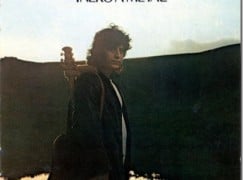We regret to share news of the death of Deb Lander, possibly Australia’s outstanding contemporary music specialist on her instrument. She was 49.
Deb, who premiered works by Elena Kats Chernin, Mark Isaacs, Margery Smith and others, was latterly professor of viola at the University of Kentucky.
She suffered cardiac arrest three years ago while on her way to watch Falstaff at Lexington Opera House. Prompt CPR brought her back and she was able to resume a normal existence. She did much to promote CPR skills and awareness within the community.
She said of the viola: ‘It’s such a fantastic, dark sound, like chocolate – dark chocolate. It’s the best instrument, no question.’
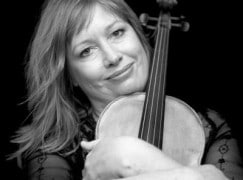
Our sympathies to her parents and family.
Meet Luca Pedro, newborn son of Carlos Kalmar, music director of the Oregon Symphony, and his wife Raffaela, a former player in the orch.
Much happiness to them all.
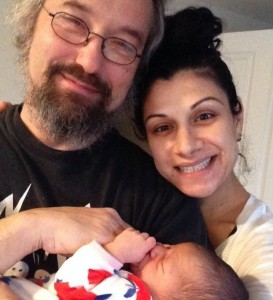
Photo: Carlos Kalmar
Somehow, the presenters of Poland’s Good Morning programme got to wondering yesterday how a viola made by Antonio Stradivarius might sound. So they called in Lech Antonio Uszynski to play the Gibson Strad, in a Polish Caprice by Grazyna Bacewicz.
Watch closely. You’ll never see anything like this on a US network breakfast show.
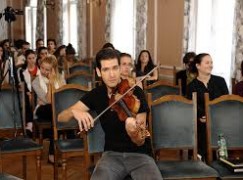
Lech, viola player of the Stradivari Quartet,was making his first TV appearance in his homeland.
The denial of access by Opera Australia to two prominent critics has sparked discussion the world over on the nature of the relationship between a state-funded opera house and a vigorous free media.
Valerio Tura, former artistic director of La Monnaie, think there should be a cordon sanitaire between the two sides. He writes to Slipped Disc:
In the best of possible worlds, critics (music, theatre, cinema, arts exhibitions, pop, rock, etc.) should have tickets paid for by their papers, and perhaps attend the shows incognito, as Michelin guide writers are supposed to do when they review a restaurant, paying their bills.
In the best of possible worlds, critics should be paid enough by their papers so that they are not forced, nor induced to accept jobs from arts organisations.
In the best of possible worlds, critics should not write program notes for a fee.
In the best of possible worlds, fashion writers, when they travel for covering a défilé, should not accept five stars hotels, top restaurants dinners, and perhaps gifts-in-kind and sex-dating with young “mannequins” (yes, I am told that this happens…!) from fashion firms…
In the best of possible worlds, soccer writers should have their tickets at the stadium paid for by their papers…
In the best of possible worlds travel & leisure writers should not accept vacations paid for by tour operators…
In the best of possible worlds art critics should not accept artworks as gifts-in-kind from young and promising painters or sculptors…
In the best of possible worlds…
However, we do not live in the best of possible worlds. We live in a world where a degree of compromise is the norm. The issue is to what extent the compromise is acceptable and sustainable. My answer is: up to the point where the deal is reasonable, mutually accepted, and – most important of all – declared.
And, I’m afraid, when the deal is broken, the organisation (opera house, tour operator, fashion designer, restaurant) has the right to refuse favours.
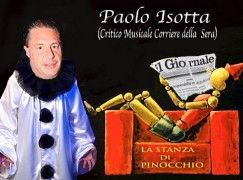
Some time ago the Teatro alla Scala started refusing complimentary tickets to Paolo Isotta, music critic of the very important Milan-based newspaper Corriere della Sera, who was evidently following his own agenda of bashing Scala policy in every way. I have not always been a fan of Stéphane Lissner, the Scala intendant, nor did I always find his artistic policy good, but in that case I thought that he was totally right.
The bottom line is that completely independent journalism is a utopia. A degree of manipulation has always existed. And will continue to do so.
The bottom line is that George Orwell’s maxim, quoted by Deborah Jones – ‘Journalism is what people don’t want to see printed, all the rest is advertising’ – is still valid.
We contacted La Scala today to clarify the position. A spokesman for the company says it stands by its past decision to refuse tickets to Isotta, who (among other vituperations) had written that Claudio Abbado was not a proper conductor and that another guest conductor had made Wagner sound homosexual. After a public exchange of letters between Lissner for La Scala and the Corriere editor in February 2013, the newspaper decided that it would refuse free tickets in future, paying itself for any critics or writers who attended any theatre. The newspaper maintains that practice up to now.
However, La Scala’s new administration, led by Alexander Pereira and Riccardo Chailly, told Slipped Disc today that, in future, no-one will be considered persona non grata at the theatre. That includes Paolo Isotta. He is welcome to request free tickets.
This seems, to us, a reasoned and sustainable position.
Among the pleasures of the holiday period was a chance to get reacquainted quietly with Felix Mendelssohn’s Songs Without Words. Often dismissed as fripperies for the middle-class living room, the Songs contain unexpected psychological depths.
I was much taken by this latest interpretation. Click here.
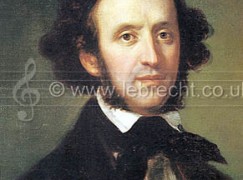
Delighted to see that the supreme French coloratura of recent times has been upgraded in the New Year’s Légion d’honneur lists. Mme Mesplé, 83, now holds the rank of Grand officier (up from Commandeur). Click here to hear her in action.
Others honoured include Paris Opéra past directors Nicolas Joel and Pierre Bergé, along with the composer Psacal Dusapin.
France decorated more musicians this year than Britain did.
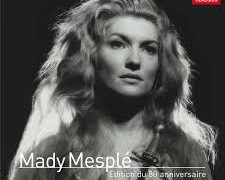
The opera festival has just announced that its chairman Gus Christie and his wife, soprano Danielle de Niese, are expecting their first baby in May. That should coincide nicely with the season opening.
Our congratulations to the happy pair.
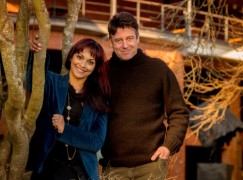
Deborah Jones, former arts and Review editor of the Australian newspaper, weighs in on the widening row between Opera Australia and much of the media, after artistic director Lyndon Lyndon Terracini refused review facilities to a pair of prominent critics.
Deborah has much to say about the personalities involved, but her most important insight touches on the consensual, sometimes collusive relationship between performing arts organisations and the newspapers that review them.
She writes:
Not only is it customary for reviewers here to accept tickets – so do senior managers, editors and writers, not necessarily all of them directly involved in the organisation’s cultural coverage. In the good old days arts organisations’ largesse was sometimes extended to administrative staff. So what? It’s always been this way.
In other words, there is an entrenched and rather touching belief on our part that disinterested media coverage plus freebies doesn’t equal oxymoron. Although it is a far from satisfactory state of affairs the system continues because it is mutually beneficial. Mostly. We media types scarcely think about the fact that, almost always, reviewers are given not one but two tickets so they can bring a friend along to work, and that drinks are almost always laid on at the premiere. What could be regarded as career-ending inducements in other fields of endeavour are part of the landscape. They don’t stop us from writing a swingeing review if we see fit. We trust ourselves, of course we do. It is insulting to suggest anything else. (Which does raise the matter of quis custodiet ipsos custodes, but let’s move on …)
Full post here.

The tenor has been explaining why Anna Netrebko (who speaks little German) pulled out of their Manon Lescaut in Novmber.
‘There were communication problems,’ he reveals. ‘Hans Neuenfels does not speak English and that became part of a really tedious rehearsal process. At times I, too, was getting desperate.’
Full interview here (auf Deutsch).
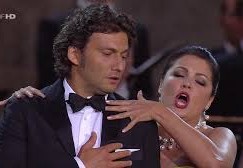
Pino Daniele, one of the first Italian singer-songwriters to embrace other cultures, died of a heart attack this weekend.
A neapolitan guitarist, he played in 197s bands before releasing Terra mia (my country), which crossed tarantella rhythms with blues and rhumba. He followed it with Nero a metà (half-black), an important early marker in Italy’s engagement with multiculturalism.
He worked with Bob Marley, Richie Havens and a range of Arab and African musicians.
